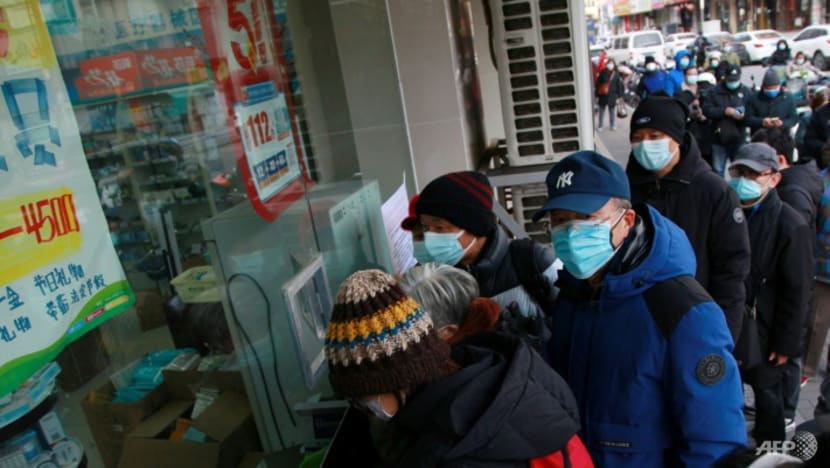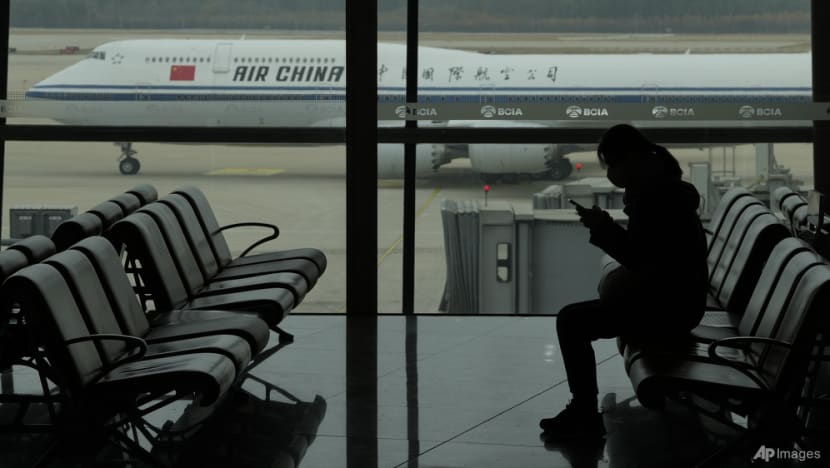As China lifts COVID-19 curbs, people should refrain from traveling unless 'absolutely necessary': Expert
As part of its lifting of pandemic restrictions, China will scrap quarantine measures for overseas arrivals starting Jan 8.

SINGAPORE: New COVID-19 variants may arise from the ongoing surge in cases in China, warned a public health expert on Tuesday (Dec 27).
“Certainly, there is a risk that new variants of COVID-19 or new subvariants of Omicron may arise from China and then spread to the rest of the world,” said Associate Professor Hsu Li Yang, vice dean of global health at the National University of Singapore’s Saw Swee Hock School of Public Health.
Dr Hsu told CNA’s Asia Now that the emergence of new variants is something also observed in other places with a sharp rise in COVID-19 cases.
As part of its lifting of pandemic restrictions, China will scrap quarantine measures for overseas arrivals starting Jan 8. Travellers would only need a polymerase chain reaction (PCR) test taken 48 hours pre-flight to enter the country.
Dr Hsu said the current wave sweeping China is the largest one since the initial outbreak in Wuhan, adding that the impact of inbound travellers on the country’s caseload would be “very little”.
He said that current estimates for China’s infections to peak in mid-January is “in line with what other countries have experienced when they open up … that the peak of the wave comes several weeks afterwards”.
HOLD OFF UNNECESSARY TRAVEL
Dr Hsu urged people to hold off any unnecessary travel overseas for the time being.
However, he acknowledged that it would be hard to prevent many from doing so, as “people have been cooped up so long that they would want to travel, especially during Chinese New Year”.
“I guess during this period, people should refrain unless it's absolutely necessary, (but) there’s really little way of stopping people from traveling, short of government restrictions,” he said.

He noted that there is already an uptick in vaccine tourism observed, with people travelling from China to Macau to get vaccinations that are unavailable in the mainland.
“As quarantine restrictions ease, I’m sure there will be people traveling elsewhere to try to get western mRNA vaccines,” he said.
Dr Hsu said a key step would be vaccinating as many people within China, including getting booster jabs to the elderly and vulnerable groups.
CHINA COPING WITH CASES
China's national health commission has stopped publishing daily COVID-19 data, and also narrowed its definition for reporting COVID-19 deaths, counting only those from COVID-caused pneumonia or respiratory failure.
Despite the lack of such data, Dr Hsu said there will still be reports on how the hospitals in the country are coping. Currently, the hospitals are overwhelmed.
“This has happened everywhere around the world, including in Singapore. You may remember during our Delta wave, there was an issue with the bed crunch as well,” he noted.
“China is trying to ramp up the number of hospital beds available, not just within hospitals, but in outside facilities. And there will be a need to triage patients based on how critical their illness condition is, in terms of who gets the bed space and who gets the ICU.”
China is also facing a shortage of medication. Worried China nationals in Singapore have been sending flu medicines back home to relatives.
Dr Hsu said that while China is trying to ramp up production of such medication, in the absence of it, people should “drink more fluids (and) take in more water”, along with resting more and remaining in cool places.
“Of course if the fever is too high, then the persons who are sick should go to a hospital. This can’t be helped, despite the fact that China's hospitals are facing a current crunch.”
BOOKMARK THIS: Our comprehensive coverage of the COVID-19 pandemic and its developments
Download our app or subscribe to our Telegram channel for the latest updates on the coronavirus pandemic: https://cna.asia/telegram














